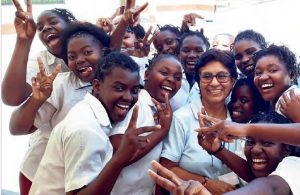Sr. Bernadette Idey, a Congolese Comboni Sister, speaks of her work as a High School headmistress and teacher.
My missionary vocation brought me to live in the Middle East, Zambia, Kenya and the Democratic Republic of Congo, my native country, where I have been for five years now. I come from the community of Mungbere, a small village situated 138 km from Isiro, the capital of the new province of Haut-Uélé, in the north of the country.
Mungbere stands at a crossroads between important cities such as Isiro, Wamba, Mambasa, Watsa and Dungu. It has more than 20,000 inhabitants belonging to different ethnic groups: Mvu, Budu, Logo, Zande, Mangbetu, Yogo, Lokele, Luba, Boa, Mbuza and Hema. There is also a considerable number of pygmies who here are called bambote. Many other people have been coming here to work in the fields or cattle rearing, to engage in commerce, to have better access to health care and education or to escape from places where security was not guaranteed. With so many languages being spoken, French is still the official language, though Lingala is the medium in daily use.
Most of the people are Catholics though there are some who belong to other Christian denominations and there is also a Moslem minority. Ours is the only female religious community in the parish of Our Lady Consoler of the Afflicted, part of the diocese of Wamba and administered by the Comboni Missionaries. The parish has a number of primary schools – including one just for pygmies – three secondary schools, a hospital which is also run by the Comboni Missionaries and social structures for the promotion of women.
I am the headmistress and a teacher at the Mavuno Institute, one of the Catholic High Schools. My job is to plan and coordinate the curriculum and extra-curricular activities. My responsibilities also include supervising all the teachers and the students who aspire to take up teaching in primary schools. Teaching provides me with an opportunity to keep in contact with young people. They sometimes need someone to listen to them and the fact that I am an African and Congolese Sister helps them to trust me. They feel at ease with me and they sometimes share their anxieties, sorrows and joys. I am here to share human, moral, Christian and professional values and I endeavour to create a favourable environment for their development.
Compassion for children coming from areas of violence encourages me to welcome them and enrol them in school, sometimes contrary to school regulations. I see them as “lost sheep” who have a right to education. This educational pastoral is a vocation that requires much patience, flexibility, availability, sacrifice, faith and love but also firmness in facing up to certain situations. The best thing of all is being surrounded by young people who give me the joy of living.
In the rural and multicultural context of our school, I try to promote unity in diversity, religious tolerance, mutual respect and the family spirit. We pay particular attention to the education of the girls and, especially that of the pygmy minority since they are quite vulnerable and easily tend to abandon the school. I encourage them to persevere in their studies as it is not easy for them to integrate into a structured educational system.
Despite everything, there are some reasons for optimism. Last year, for the first time in the history of the Institute, we had a Pygmy candidate for the state exams which he passed. It was a cause of great joy for all of us and I hope it may serve as an example and inspiration for the other pygmy students still attending the school.
One of my joys is to see how an increasing number of girls succeed in finishing secondary school with good results in the state exams at the end. Those fortunate enough to go on to university are doing well and this is very encouraging. Only a few years ago, the girls would study much less than the boys and often gave up their lessons while still very young.
Most of the families of Mungbere earn their living by agriculture. The very poor roads mean we are cut off for several months of the year. Then, transport whether of people or goods is rather expensive. The produce of the fields is practically all sold locally and at a rather low price.
At the parish level, I help with youth ministry, especially as spiritual director of the KA Group which promotes the human and Christian formation of the children according to the spirituality of the Ugandan Martyrs and Blessed Marie-Clémentine Anuarite. I also accompany the girls who express a desire to respond to the religious and missionary vocation.
I believe the Mission is everywhere. I am happy with my work in the field of education since it provides me with a vast field of apostolate and the opportunity to spend time with people of different social levels, sharing their sorrows and their joys. I do this in the footsteps of Jesus Christ, the teacher par excellence and of Saint Daniel Comboni, making common cause with my people.







